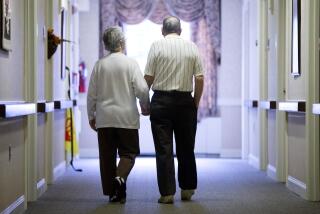Benefits Going Up Only 3.1% : New Year Will Mean Hike in Social Security Taxes
- Share via
WASHINGTON — The new year will ring in bigger benefit checks for the nation’s 37 million Social Security recipients, but workers and employers alike will have to dig deeper into their pockets to pay for them.
The change in the calendar will also mean higher out-of-pocket hospital costs for Medicare patients and an end--at least temporarily--to business tax breaks designed to stimulate research and development, minority-member hiring and use of alternative forms of energy such as solar or geothermal heating.
Today ushers in a number of changes in aid and tax programs that will, in one way or another, touch most American households and industries.
The most significant of those changes involves Social Security, which, for the last decade, has seen benefit levels raised annually to compensate the elderly for inflation. Beginning with the January benefit checks, which the government will mail out Friday, the nation’s elderly are in line to receive a 3.1% cost-of-living increase.
Federal benefits for the 4 million aged, blind or disabled Americans getting monthly checks under the Supplemental Security Income program also will be increased by 3.1%.
But, with inflation moderating, the 1986 cost-of-living adjustment is the lowest since benefit hikes became automatic.
“For a worker who retired at 65 in 1985 and is presently getting the maximum (benefit) of $717, that means his or her check on Friday will grow to $739,” James Brown, a spokesman for the Social Security Administration, explained. Brown said that the average monthly benefit paid out in 1986 will be $478, up $14 from last year.
To help pay for the increases, as well as to ensure the solvency of the old-age pension program, both employees and employers will have to kick in an extra dime in Social Security taxes for every $100 earned up to $42,000. The increases were mandated by a 1983 law reforming the Social Security system.
Higher-paid workers will also be hit by an increase in the maximum amount of Social Security taxes, to $3,003 from $2,791 in 1985. Last year, the payroll tax was levied on the first $39,600 of income.
Military Pensions
Like their counterparts in the private sector, military and federal civilian pensioners had been in line for automatic cost-of-living increases at the first of the year. However, a controversial budget-balancing program signed into law by President Reagan last month delayed those increases for at least three months, when, in all likelihood, they will be reduced in scope or eliminated entirely.
Although Social Security benefits are going up, the nation’s ailing elderly will be required to pay more for their medical care. Medicare patients now must cover the first $492 of charges for their first day in a hospital, up from $400.
And, although Medicare still will pick up the full tab for the next 59 days of hospitalization, long-term patients will be required to cover $123 in expenses per day, up from $100, for their 60th to 90th days in a medical center and $246 a day--an increase of $46--for stays beyond that.
Medicare patients housed in skilled nursing facilities, who had been charged $50 a day for stays of 21 to 100 days, now must pay $61.50 a day. The program still will pay all costs of short- and long-term stays.
Tax Breaks Expire
In addition, the fates of several expiring tax breaks remain muddled. Before it recessed for the holidays, Congress considered legislation extending the life of several popular tax credits scheduled to expire near the end of 1985, but last-minute squabbling over an unrelated spending program blocked a House-Senate agreement on renewing any of them. Some of the credits may be revived retroactively when lawmakers return to work later this month.
But, for now, popular tax breaks to businesses and individuals for installing energy-saving systems are dead, as are tax breaks to foster industrial research, hiring programs for minority members and the poor and group legal services, housing programs and ride-sharing programs provided by employers.
Also lapsed is a tax credit designed to help workers in industries hit hard by foreign competition, a 4-cent-a-gallon cut in federal taxes on fuel for taxi drivers and a special program designed to ease the tax burden of widows of servicemen still listed as missing in action from the Vietnam War.
More to Read
Inside the business of entertainment
The Wide Shot brings you news, analysis and insights on everything from streaming wars to production — and what it all means for the future.
You may occasionally receive promotional content from the Los Angeles Times.










